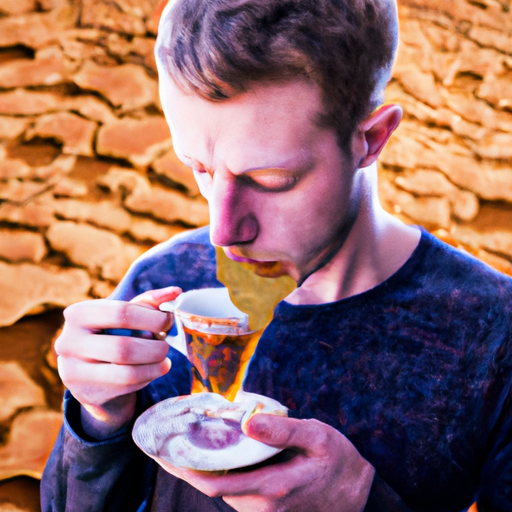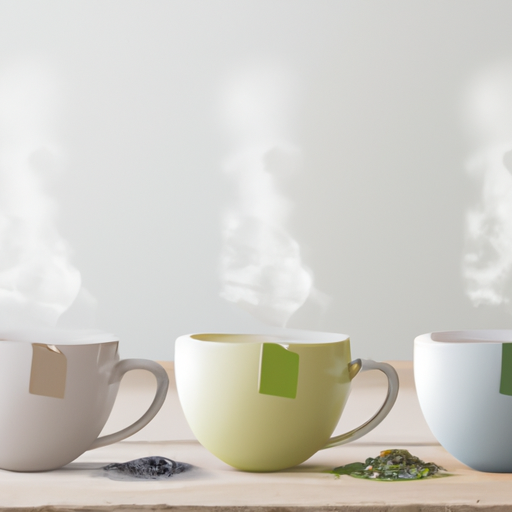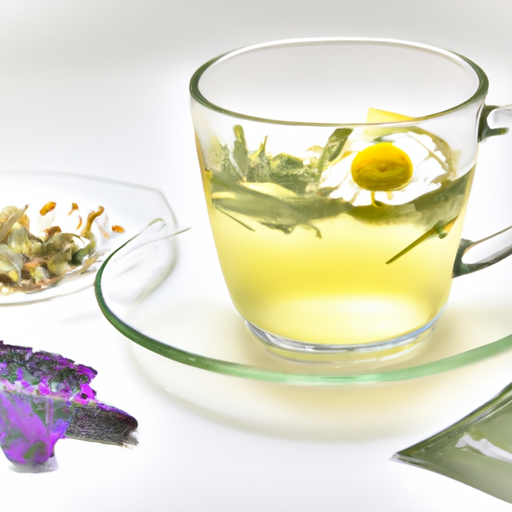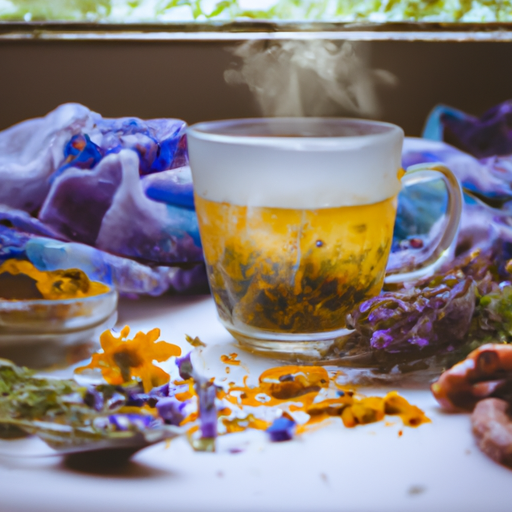Have you ever encountered the unpleasant experience of taking a sip of herbal tea, only to be greeted by a foul odor? It’s akin to stumbling upon a forgotten bouquet of flowers that has wilted and decayed. As an avid tea drinker, I understand the disappointment and confusion that arises from this unsettling phenomenon. But fear not, for I have delved into the depths of tea chemistry to unravel the mystery behind why herbal tea can smell bad after sitting out.
In this article, we will explore the intricate chemical reactions that occur in herbal tea, the role of temperature and time, the impact of storage conditions, and the influence of herbal ingredients. Additionally, we will delve into the importance of freshness and provide you with valuable tips on how to prevent and troubleshoot bad-smelling tea.
So, grab a cup of your favorite herbal blend, and let’s embark on this aromatic journey together.
Key Takeaways
- Herbal tea can develop a bad smell due to oxidation and microbial growth when exposed to air and left at room temperature.
- Proper storage conditions, such as using airtight containers, keeping tea away from light and heat, controlling moisture, and avoiding strong odors, can help preserve the freshness and aroma of herbal tea.
- Using tainted utensils or containers can affect the taste and aroma of tea.
- Pay attention to brewing time and temperature to avoid releasing bitter compounds.
The Chemical Reactions that Occur in Herbal Tea
You might be surprised to learn that when herbal tea sits out, the chemical reactions taking place can result in an unpleasant smell. This is due to the oxidation process and microbial growth that occur when the tea is exposed to air and left at room temperature.
During the oxidation process, the compounds in the tea leaves react with oxygen in the air, causing changes in their chemical structure. This can lead to the formation of new compounds that have strong odors, resulting in the unpleasant smell of the tea.
Additionally, when the tea is left out, it provides an ideal environment for microbial growth. Bacteria and fungi thrive in warm and moist conditions, and the tea left sitting at room temperature provides just that. As these microorganisms grow and multiply, they release metabolic byproducts that contribute to the foul smell of the tea.
The role of temperature and time in these chemical reactions and microbial growth cannot be underestimated. Higher temperatures accelerate these processes, leading to faster deterioration of the tea’s aroma. Similarly, the longer the tea sits out, the more time the microorganisms have to proliferate and produce unpleasant-smelling compounds. So, it’s important to store herbal tea properly and consume it while it’s fresh to avoid the development of a bad smell.
The Role of Temperature and Time
When herbal tea sits out for a while, it might start to develop an unpleasant aroma due to the combination of time and temperature. The role of temperature and time cannot be underestimated when it comes to the chemical reactions that occur in herbal tea.
The temperature at which herbal tea is brewed and the duration for which it is left out can greatly impact its quality and taste. Higher temperatures can cause the essential oils present in the tea leaves to evaporate more quickly, leading to a loss of aroma. Additionally, prolonged exposure to heat can promote the growth of bacteria and mold, which can further contribute to the unpleasant smell of the tea.
Time duration also plays a crucial role in the development of an unpleasant aroma. As time passes, the compounds in the tea undergo oxidation and degradation, resulting in changes in flavor and aroma. This is particularly true for herbal teas that contain volatile compounds, such as chamomile or peppermint.
Understanding the temperature effects and time duration is essential for preserving the freshness and aroma of herbal tea. However, it’s important to note that the impact of storage conditions, such as air exposure and humidity, also contribute to the changes in aroma.
The Impact of Storage Conditions
Imagine a world where the delicate dance of air exposure and humidity transforms a once vibrant elixir into a shadow of its former self. When it comes to herbal tea, the impact of storage conditions cannot be underestimated. The way you store your herbal tea can greatly affect its aroma and taste. Let’s explore how different storage conditions and packaging materials can make a difference.
-
Airtight containers: Storing herbal tea in airtight containers helps preserve its freshness by minimizing air exposure.
-
Dark and cool places: Keeping herbal tea away from light and heat helps prevent the breakdown of its delicate flavors and aromas.
-
Moisture control: Moisture is the enemy of herbal tea. Storing it in a dry environment helps prevent the growth of mold and bacteria.
-
Avoid strong odors: Herbal tea is like a sponge that absorbs surrounding smells. Storing it away from strong-smelling substances prevents flavor contamination.
-
Quality packaging materials: Using high-quality packaging materials, such as foil-lined bags, helps maintain the tea’s freshness and aroma for longer periods.
By understanding the importance of proper storage conditions and packaging materials, you can ensure that your herbal tea retains its delightful scent even after sitting out.
Now, let’s delve into the influence of herbal ingredients on the overall aroma and flavor profile of tea.
The Influence of Herbal Ingredients
To fully appreciate the delightful aroma and flavor of your herbal tea, let your senses be whisked away by the enchanting influence of its carefully selected herbal ingredients.
Herbal tea is not only a soothing beverage but also a source of numerous health benefits. Each herb used in herbal tea has unique properties that contribute to its distinctive scent and taste. For example, chamomile is known for its calming aroma, while peppermint has a refreshing and invigorating scent. The combination of these herbs creates a harmonious blend that tantalizes the senses.
Apart from their aromatic qualities, herbal ingredients also offer various health benefits. For instance, ginger is often used in herbal teas for its anti-inflammatory properties, while lavender is believed to aid relaxation and promote better sleep. Echinacea is known for its immune-boosting properties, making it a popular choice during cold and flu season. By incorporating these herbal ingredients into your tea, you not only enjoy a delightful aroma but also reap the health benefits they provide.
Now, let’s transition to the subsequent section about the importance of freshness.
The Importance of Freshness
Experience the true essence of your herbal tea by savoring its freshness, ensuring a delightful and invigorating sip every time. When it comes to herbal tea, freshness plays a vital role in both its aroma and taste. Here are some reasons why freshness is of utmost importance:
-
Aromatic potency: Fresh herbal tea retains its natural fragrance, allowing you to fully experience the enticing scents of the herbs and flowers used in the blend.
-
Enhanced flavor: Freshness ensures that the flavors of the herbs are preserved, resulting in a more vibrant and satisfying taste.
-
Nutritional value: Herbal teas are known for their various health benefits, and consuming them while they are fresh ensures that you receive the maximum nutritional value from the herbs.
-
Enjoyment factor: Drinking herbal tea is not just about the health benefits; it’s also about the pleasure of savoring a delicious and aromatic beverage.
By understanding the connection between freshness and taste, you can fully appreciate the benefits of drinking herbal tea.
Now, let’s explore how to prevent bad smells in herbal tea without compromising its freshness.
How to Prevent Bad Smells in Herbal Tea
Savor the delightful aroma of your freshly brewed herbal tea by following these simple steps to prevent any unpleasant odors.
When preparing herbal tea, it’s important to consider the different tea varieties and their unique characteristics. Some herbs, like chamomile and lavender, have a naturally strong scent, while others, like peppermint and ginger, are more subtle.
To ensure your tea smells fresh and inviting, start by using high-quality herbs that are properly stored and not expired. Store your herbs in airtight containers away from light, heat, and moisture to maintain their freshness.
When brewing herbal tea, use the right amount of herbs and water, and steep for the recommended time to extract the flavors without overdoing it. Avoid using metal utensils or containers, as they can alter the taste and aroma of the tea.
Finally, make sure to strain the tea properly to remove any excess herbs or particles that could contribute to a bad smell.
By following these steps, you can enjoy a delicious cup of herbal tea without any unpleasant odors.
Now, let’s explore some troubleshooting tips for bad-smelling tea.
Troubleshooting Tips for Bad-Smelling Tea
Now that we have discussed some preventive measures to avoid bad smells in herbal tea, let’s delve into troubleshooting tips for bad-smelling tea. As an avid tea drinker, I have encountered my fair share of unpleasant odors emanating from my beloved brew. However, fear not, for there are several brewing techniques that can help combat this issue.
One of the main causes of bad-smelling tea is tea expiration. Just like any other food or beverage, tea has a shelf life, and consuming it past its prime can result in a less-than-desirable aroma. To ensure the freshness of your herbal tea, it is crucial to check the expiration date before brewing a cup.
Moreover, proper storage plays a vital role in preserving the aroma of your tea. Keep your herbal tea in an airtight container away from direct sunlight and moisture. This will help prevent any unwanted odors from seeping into the leaves.
In addition to these precautions, pay attention to the brewing time and temperature. Overbrewing or using water that is too hot can release bitter compounds and contribute to an unpleasant smell. Follow the recommended brewing instructions for your specific herbal tea to achieve the best results.
Now, let’s take a closer look at these troubleshooting tips in the table below:
| Troubleshooting Tips for Bad-Smelling Tea |
|---|
| Check the expiration date of your tea |
| Store tea in an airtight container away from sunlight and moisture |
| Pay attention to brewing time and temperature |
By implementing these brewing techniques and ensuring the freshness of your herbal tea, you can enjoy a delightful aroma and a satisfying cup of tea every time.
Frequently Asked Questions
Can herbal tea go bad and become harmful to consume?
Herbal tea can go bad and become harmful to consume if not stored properly. It is important to follow the recommended brewing time and store the tea in airtight containers to maintain its freshness and prevent bacterial growth.
Can adding sweeteners or milk to herbal tea affect its smell?
Adding sweeteners or milk to herbal tea can affect its smell. Sweeteners can give a pleasant aroma, while milk can make the tea smell sour or spoiled if left out for too long.
Is it safe to drink herbal tea that smells bad but tastes fine?
It is generally safe to drink herbal tea that smells bad but tastes fine. However, the aroma of herbal tea can be affected by brewing temperature and storing it in airtight containers.
Does the type of water used to brew herbal tea affect its smell?
The brewing method used for herbal tea can affect its smell. Factors such as water temperature, steeping time, and the type of water used can all contribute to the aroma. Additionally, the surrounding environment and storage conditions can impact the smell of herbal tea.
Can herbal tea smell bad if it has expired or is past its best-by date?
Yes, herbal tea can lose its aroma over time, and storing it in a warm environment can definitely affect its smell. However, it won’t smell as bad as a skunk drenched in expired herbal tea!
Conclusion
In conclusion, it’s crucial to understand the factors that contribute to the unpleasant smell of herbal tea when left out.
Chemical reactions, temperature, and time all play a role in this process. Additionally, storage conditions and the types of herbal ingredients used can greatly influence the aroma.
Lastly, maintaining freshness is key to preventing bad smells. By following these guidelines and implementing troubleshooting tips, we can ensure that our herbal tea retains its delightful fragrance for a truly enjoyable experience.










